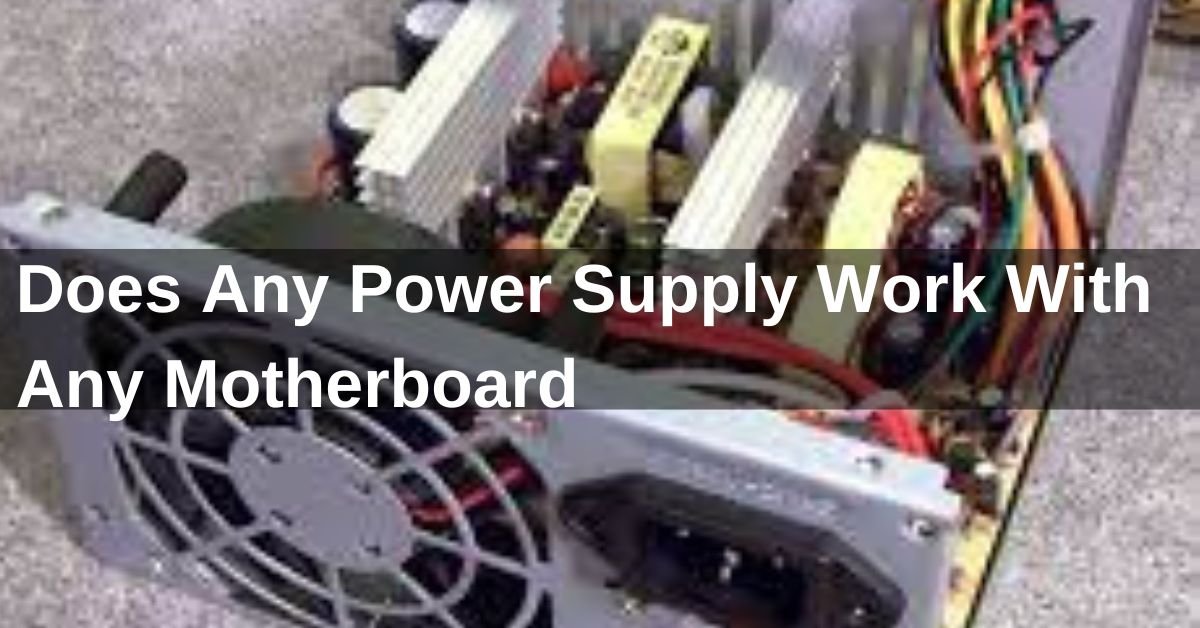In the world of computer hardware, one of the fundamental questions that often arise among enthusiasts and builders is whether any power supply can work seamlessly with any motherboard. It’s a pertinent query given the complexity and interdependence of components within a computer system.
No, not every power supply works with every motherboard. You need to match the power supply’s connectors and wattage to the motherboard’s requirements for proper functioning and to avoid damage.
In this article, we’ll talk about how power supplies and motherboards can work together and “Does Any Power Supply Work With Any Motherboard”.
What is a Motherboard?
The motherboard is the main circuit board within a computer, providing connectivity between the CPU, RAM, storage devices, expansion cards, and other peripherals. It houses the essential components necessary for the computer to function effectively.
What is a Power Supply?
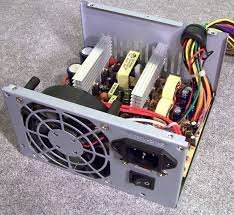
A power supply unit delivers electrical power to the components of a computer. It typically comprises various connectors and cables to provide power to different parts of the system, including the motherboard, CPU, graphics card, and drives.
Read: Tuf Gaming Motherboard Wifi Not Working – Ultimate Guide!
Understanding Power Supplies and Motherboards:
Power supply units (PSUs) are responsible for converting AC power from the electrical outlet into DC power that your computer components can use.
On the other hand, motherboards act as the central hub connecting all the components of your PC, including the CPU, RAM, GPU, and storage devices.
Read: Can Power Supply Damage Motherboard – Ultimate Guide – 2024
Compatibility Factors:
Several factors determine whether a power supply is compatible with a motherboard. One primary consideration is the form factor of the power supply and the corresponding mounting points in the PC case.
Additionally, the motherboard’s connectors and standards must align with those provided by the power supply.
Importance of Compatibility:
Ensuring compatibility between the power supply and the motherboard is crucial for the overall stability and performance of the system. Incompatible components can lead to system failures, damage to hardware, and even safety hazards.
Wattage and Voltage Requirements:
Matching the wattage of the power supply to the requirements of the motherboard and other components is crucial. Insufficient power can lead to system instability, while excess power may result in inefficiency and increased energy consumption.
PCIe Connectors and Expansion Cards:
Modern motherboards often require PCIe connectors to accommodate expansion cards such as graphics cards, Wi-Fi adapters, and sound cards. Ensuring that the power supply provides sufficient PCIe connectors is vital for compatibility.
Read: Can A Motherboard Fit In Any Case – Ultimate Guide – 2024
Different Types Of Power Supplies:
Here are some common types of power supplies:
- Linear Power Supply (LPS):
- Switched-Mode Power Supply (SMPS):
- Uninterruptible Power Supply (UPS):
- Battery Eliminator Power Supply (BEPS):
- Programmable Power Supply:
- Switching AC Power Supply:
- DC-DC Converter:
- Rack-Mount Power Supply:
Different Types Of Motherboards:
There are several types of motherboards, including ATX, microATX, and mini-ITX. Each varies in size, features, and compatibility with other components like CPUs and expansion cards.
What PSU Works With What Motherboard?
No, not all power supply units (PSUs) work with all motherboards. It depends on factors like compatibility with power connectors, wattage, and form factor. Always check compatibility before connecting them.
Read: Do All GPU Fit All Motherboards – Comprehensive Guide – 2024
Can Any PSU Work With Any Motherboard?
No, not every PSU can work with every motherboard. It depends on factors like compatibility with power connectors, wattage, and form factor. Always check compatibility before connecting.
Read: What Does Cha Fan Mean On Motherboard – Complete Guide!
Can I use any power supply for my PC?
No, you cannot use any power supply for your PC. It needs to match the required connectors, power output, and form factor of your components, especially the motherboard and graphics card.
Are power supplies universal for motherboards?
No, power supplies are not universal for motherboards. They need to match in terms of connectors and power ratings. Different motherboards may require different types of power supplies to work correctly.
How do I know if my power supply will fit?
To check if your power supply fits, look for its form factor (like ATX, SFX) and dimensions. Compare these with the space in your computer case. If they match, it should fit.
How to tell if PSU’s are compatible?
To check PSU compatibility, match connectors with your motherboard, like ATX, Micro-ATX, or Mini-ITX. Ensure PSU wattage suits your system’s needs for reliable power supply.
Read: Do Motherboards Come With Windows – Ultimate Guide – 2024
How do I know if a PSU fits with my motherboard?
To check if a PSU fits your motherboard, see if they have matching connectors. Look for ATX, Micro-ATX, or Mini-ITX labels. Ensure the PSU’s wattage meets your system’s needs.
How do I know if my power supply is compatible with my motherboard?
To ensure compatibility, check the power supply’s wattage and connectors against your motherboard’s requirements. Verify that the PSU provides enough power and has the necessary connectors to fit your motherboard’s sockets.
How Do I Check Power Supply and Motherboard Compatibility?
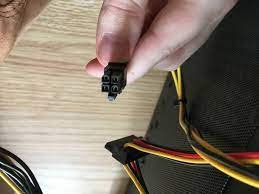
To check power supply and motherboard compatibility, look at the PSU’s wattage and connectors. Match the wattage with your system’s needs, and ensure the PSU connectors fit the motherboard sockets.
Are All PSU Compatible With Motherboards?
Yes, not all power supply units (PSUs) are compatible with all motherboards. It’s important to check the PSU’s specifications and the motherboard’s requirements for compatibility before installation.
How To Make Sure All Your Computer Hardware Parts Are Compatible?
To ensure compatibility among computer hardware parts, use online tools like PCPartPicker or research each component’s specifications. Check for matching socket types, form factors, power requirements, and supported interfaces.
Can I Use Any PSU With Any Motherboard?
Yes, you can generally use any PSU (Power Supply Unit) with any motherboard as long as the PSU’s connectors match the motherboard’s power input requirements and wattage is sufficient.
Can I Put Any PSU in My Computer?
Yes, you can usually put any PSU (Power Supply Unit) in your computer as long as it fits your computer case and provides enough power for your components.
Can a PSU Be Incompatible?
Yes, a PSU can be incompatible if it doesn’t match the motherboard’s connectors, wattage requirements, or form factor. Always check compatibility between your PSU and motherboard to avoid issues.
Read: Motherboard Wifi Antenna Not Working – Ultimate Guide – 2024
Do All Motherboards Have the Same Power Supply?
No, all motherboards do not have the same power supply requirements. Different motherboards may require different power supply units (PSUs) based on their specifications and power needs.
Are All PPSU the Same Size?
No, not all PSUs are the same size. They come in different form factors. It’s crucial to choose a PSU size compatible with your computer case to ensure proper fit.
Do All PSU Fit All Motherboards?
No, not all PSUs fit all motherboards. Compatibility depends on factors like PSU form factor, wattage, and connectors. Ensure your PSU matches your motherboard’s requirements for safe and proper operation.
How Do I Know If My PSU is Compatible with My Motherboard?
To confirm PSU compatibility with your motherboard, review the PSU’s connectors, wattage, and form factor. Check your motherboard’s specifications for recommended PSU types and wattage requirements.
Can a Motherboard Damage a PSU?
Yes, a malfunctioning motherboard can potentially damage a PSU. It’s important to ensure both components are in good working order and compatible to avoid any risk of damage.
Read: Z690 Motherboard Wifi Not Working – Ultimate Guide – 2024
Can a PSU Damage a Motherboard?
Yes, a faulty or incompatible PSU can damage a motherboard. Ensure your PSU meets the required specifications, has stable voltage output, and proper connectors to prevent potential damage.
Is my PSU compatible with my motherboard and processor?
To check if your PSU works with your motherboard and processor, ensure it has the right connectors and sufficient power output. Refer to your motherboard and processor specifications to confirm compatibility.
Power Supply Compatibility Checker?
A power supply compatibility checker is a tool or software that helps users determine if a specific power supply is compatible with their computer components, such as motherboards and graphics cards.
Read: Are All Graphics Cards Compatible With All Motherboards – Ultimate Guide!
What Power Supply Is Compatible With My Motherboard?
To know what power supply is compatible with your motherboard, check its specifications. Most motherboards support standard ATX power supplies, but verify the form factor and wattage requirements for compatibility.
Read: Dram Light On Motherboard – Complete Guide – 2024
Power Supply Compatibility Chart.
A power supply compatibility chart shows which power supplies work with different computer components like motherboards and graphics cards. It helps users select the right power supply for their setup.
H61 Motherboard Supported Power Supply?
An H61 motherboard typically supports standard ATX power supplies. These supplies provide the necessary electricity for the motherboard and its components, ensuring proper functionality and performance of the computer system.
Micro Atx Power Supply.
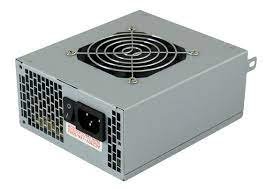
A Micro ATX power supply is a compact unit that provides electricity to Micro ATX motherboards. It’s smaller than standard ATX supplies, suitable for smaller computer cases while delivering sufficient power.
Will an ATX PSU be compatible with a Micro ATX motherboard?
Yes, an ATX PSU (power supply unit) will work with a Micro ATX motherboard. They’re compatible because both use standard connections and sizes, even though the motherboard is smaller.
What are motherboard or PSU issues?
Motherboard issues can include faulty ports, failure to boot, or compatibility problems with components. PSU (power supply unit) issues may involve overheating, power fluctuations, or failure to provide enough power to the system.
How do you identify the compatible power supply to a given motherboard?
To find a compatible power supply for your motherboard, check the motherboard’s specifications for the required power connector type and wattage.
Match this with the power supply’s specifications, ensuring it meets or exceeds the motherboard’s requirements.
Can using an incompatible PSU (power supply unit) with a motherboard damage the computer?
Yes, using an incompatible PSU with a motherboard can potentially damage the computer. It may lead to power irregularities, overheating, or insufficient power delivery, risking harm to components like the CPU, GPU, or motherboard itself.
Can a bad PSU damage a GPU or motherboard?
Yes, a faulty PSU (power supply unit) can damage both a GPU (graphics processing unit) and a motherboard. It may cause power surges or inadequate power delivery, leading to hardware malfunction or permanent damage.
Can any power supply work with any motherboard?
Not necessarily. While many power supplies are compatible with different motherboards, it’s essential to match the PSU’s connectors, wattage, and form factor with the motherboard’s requirements to ensure proper functionality and prevent potential damage.
Power supply compatibility with motherboard?
Make sure your power supply fits your motherboard. Check the connectors, wattage, and form factor. Matching these ensures they work well together. Incorrect pairing could cause problems or damage your computer parts.
Does any psu work with any motherboard?
Not every PSU works with every motherboard. It’s crucial to match the PSU’s connectors, wattage, and form factor with the motherboard’s requirements. This ensures proper compatibility and prevents potential damage to your computer components.
How to check if power supply is compatible with motherboard?
To check compatibility between a power supply (PSU) and a motherboard, examine the PSU’s connectors, wattage, and form factor, ensuring they match the motherboard’s specifications.
Refer to the motherboard’s manual or manufacturer’s website for details on required PSU specifications.
How to know if power supply is compatible with motherboard?
To determine compatibility between a power supply (PSU) and a motherboard, check if the PSU connectors match those on the motherboard, ensure the PSU provides sufficient wattage, and verify that the form factor fits the case. Refer to the motherboard’s manual for specific requirements.
Are PSUs compatible with all motherboards?
Not necessarily. While many PSUs are compatible with different motherboards, it’s crucial to match connectors, wattage, and form factors. Ensuring compatibility prevents potential damage and ensures proper functioning of your computer system.
Does the power supply have to be compatible with the motherboard?
Yes, the power supply must be compatible with the motherboard. Matching connectors, wattage, and form factors ensures proper functioning and prevents potential damage to your computer components. Always check compatibility before installing or replacing a power supply.
Can any psu work any motherboard?
Not all power supplies can work with every motherboard. It’s important to check compatibility by matching connectors, wattage, and form factors. This ensures they function well together and prevents potential damage to your computer components.
Does the psu have to be compatible with the CPU?
Yes, the PSU needs to be compatible with the CPU indirectly. The PSU powers all components, including the CPU. Matching the PSU’s wattage and connectors to the CPU’s requirements ensures proper functionality and prevents damage.
Will any psu work with any motherboard?
Not every PSU can work with every motherboard. It’s important to match the PSU’s connectors, wattage, and form factor with the motherboard’s requirements to ensure compatibility and avoid potential damage to your components.
Can you use any psu any motherboard?
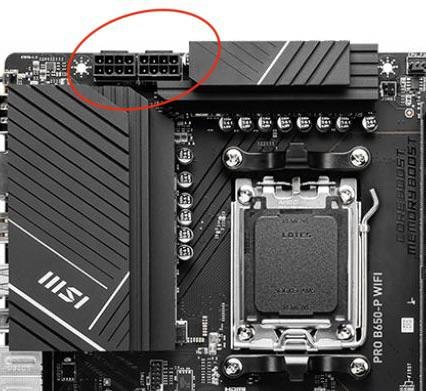
Not every PSU can be used with every motherboard. It’s important to check if they match in terms of connectors, wattage, and size. This ensures they work together safely and effectively. Always verify compatibility before connecting them.
Read: Are HP Motherboards Good – Complete Guide – 2024
FAQs:
1. How do I know if my motherboard is compatible with a PSU that I want to buy?
To know if your motherboard is compatible with a PSU, check the PSU’s connectors and wattage. Match the motherboard’s power requirements with the PSU’s output. Ensure connectors like 24-pin and CPU power match.
2. Can a PSU fry a motherboard?
Yes, a PSU can fry a motherboard if it malfunctions or delivers incorrect voltages. Ensure your PSU is compatible and functioning properly to avoid damaging your motherboard.
3. Do am4 motherboards need new PSU? Or can I use my old one?
You can use your old PSU with an AM4 motherboard if it has the right plugs and enough power for your parts. Check compatibility and power requirements before connecting.
4. How do I test a PSU without a motherboard?
To test a PSU without a motherboard, you can use a paperclip test. Unplug the PSU, bend a paperclip, connect one end to the green wire and the other to any black wire in the 24-pin connector. Then plug in the PSU.
5. I just bought a B450 ATX AMD motherboard. What power supply unit will be appropriate for it (because most PSU have different pins and I worry it may not fit my motherboard)?
For a B450 ATX AMD motherboard, you’ll need a standard ATX power supply unit (PSU). Look for one with a 24-pin ATX connector, which is the standard for most modern motherboards.
6. Can a powerful PSU fry a motherboard? How do you prevent it?
Yes, a powerful PSU can potentially fry a motherboard if it delivers excessive voltage. To prevent this, ensure the PSU’s wattage matches your system’s requirements and that it has proper voltage regulation.
7. How do I make sure my PSU and motherboard are compatible together?
To ensure compatibility between your PSU and motherboard, check their specifications. Match the motherboard’s power connector (e.g., ATX, EPS) with the PSU’s connectors and ensure the PSU delivers sufficient wattage.
8. I have a 650W switching power supply ATX micro. Will it work with my gigabyte f2a78m-d3h motherboard, or will I need a full sized power supply?
Yes, your 650W switching power supply should work fine with your Gigabyte F2A78M-D3H motherboard. You don’t need a full-sized power supply for your motherboard.
9. How do I determine if a given GPU is compatible with some motherboard?
To check if a GPU is compatible with a motherboard, ensure the motherboard has the right PCIe slot for the GPU and that the power supply can handle its requirements. Compatibility ensures smooth operation.
10. What are the compatibility issues to consider when choosing a power supply unit (PSU) for a motherboard?
When choosing a power supply unit (PSU) for a motherboard, consider compatibility issues like matching the PSU connectors to the motherboard’s power inputs and ensuring adequate wattage for components.
Conclusion:
In conclusion, it’s important to ensure compatibility between your power supply unit (PSU) and motherboard to avoid system failures and potential damage. Matching connectors, wattage, and form factors are key considerations. Remember to check specifications carefully before connecting components to ensure smooth operation and optimal performance of your computer system.
